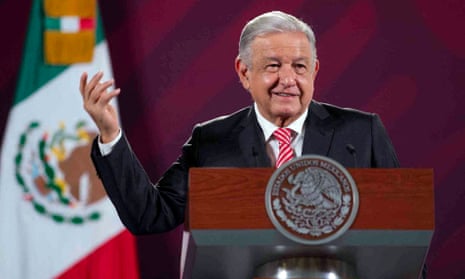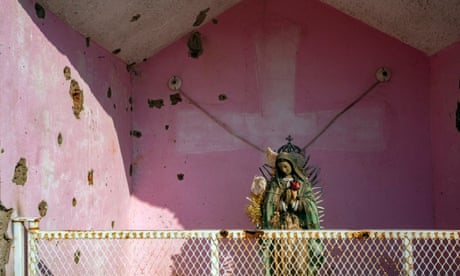Andrés Manuel López Obrador’s comments come after an activist’s open letter to crime groups to stop forced disappearances
 Andrés Manuel López Obrador speaking during a press conference in Mexico City.
Andrés Manuel López Obrador speaking during a press conference in Mexico City. Oscar Lopez in Mexico City
THE GUARDIAN
Wed 31 May 2023
Mexico’s president Andrés Manuel López Obrador has said he would support an agreement with some of the nation’s most powerful and violent cartels in order to stop the bloodshed that has overwhelmed the country.
The comments from López Obrador, or Amlo as he’s commonly known, came after an activist searching for her missing brother published an open letter directed at 10 organized crime groups calling for them to stop the practice of forced disappearance, where a person isn’t just killed but completely erased, their body dissolve in acid or burnt to ash.
“I agree and I hope we achieve peace – that’s what we all want,” said Amlo during his daily morning news conference when asked about the proposed pact. “Violence is irrational and we’re going to continue looking for peace, to achieve peace and that is what we’re doing. And if there is an initiative of this kind, of course we support it.”
More than 100,000 people have disappeared in Mexico since 1964, the majority in the last 15 years or so since the government at the time launched its war against cartels, sending the military out into the streets and taking down key organized crime leaders.

Land of no return: the Mexican city torn apart by cartel kidnappings
López Obrador, elected in a 2018 landslide, promised a different, non-confrontational approach which he called “hugs not bullets”. He also vowed to take the military off the streets: instead, he has vastly expanded the army’s funding and administrative power, while creating a national guard force with more than 100,000 troops.
But the efforts have done little to staunch the bloodshed: more than 30,000 people have been killed every year of Amlo’s administration, and more than 40,000 have been reported missing since he took office, according to government figures.
“Mexico has been submerged in a spiral of violence that has left a deep mark on society,” wrote activist Delia Quiroa, who has been looking for her brother for nearly a decade, in her letter to gangs including the Jalisco New Generation and Sinaloa cartels. “Reality has surpassed fiction and the number of missing persons in our country is impossible to count accurately.”
Making an appeal to the commonality between gangsters and victims, marked by traditions like Mother’s Day and Day of the Dead, Quiroa called on the cartels to sign “a social pact to prevent and eradicate the disappearance of people in Mexico and promote peace”.
Quiroa said that the idea for a pact with the cartels emerged from the desperation felt by family members of the disappeared who are fed up with the government’s lack of response to the crisis of missing people.
“It’s a struggle day after day after day,” she told the Guardian. “All we want is to know what happened, if [our relatives] are dead, if we can give them a dignified burial.”
When asked about the possibility of an agreement with the cartels, López Obrador said that he would support anything that would mean curbing Mexico’s ongoing carnage.
“I approve of everything that means putting aside or not using violence,” he said. Cartel members “should assume responsibility and behave like good citizens”.
Quiroa welcomed the president’s support for her pact with organized crime, but said that more needed to be done to help relatives of the missing locate their loved ones – dead or alive.
“What does it matter if the people below [the president], who are in charge of helping victims, don’t care?” she said. “He needs to supervise his people, to make sure they actually do something.”
Angélica Durán-Martínez, a security expert at the University of Massachusetts Lowell said that finding solutions to violence beyond militarization isn’t necessarily outlandish, given that years of all-out war with cartels have only resulted in bloodshed.
“Putting emphasis on how are we going to reduce violence, how are we going to reduce the humanitarian costs and take emphasis away from pursuing crime at all costs,” she said. “It’s an idea that should have a more central place in public policy.”
But without a strategy that takes into account the realities of organized crime in Mexico, the president’s words risk remaining just that.
“Simply declaring it doesn’t mean anything, because the first big problem is how do you do it,” she added. “How do you do it without increasing the power of these organized crime groups?”
Mexico’s president Andrés Manuel López Obrador has said he would support an agreement with some of the nation’s most powerful and violent cartels in order to stop the bloodshed that has overwhelmed the country.
The comments from López Obrador, or Amlo as he’s commonly known, came after an activist searching for her missing brother published an open letter directed at 10 organized crime groups calling for them to stop the practice of forced disappearance, where a person isn’t just killed but completely erased, their body dissolve in acid or burnt to ash.
“I agree and I hope we achieve peace – that’s what we all want,” said Amlo during his daily morning news conference when asked about the proposed pact. “Violence is irrational and we’re going to continue looking for peace, to achieve peace and that is what we’re doing. And if there is an initiative of this kind, of course we support it.”
More than 100,000 people have disappeared in Mexico since 1964, the majority in the last 15 years or so since the government at the time launched its war against cartels, sending the military out into the streets and taking down key organized crime leaders.

Land of no return: the Mexican city torn apart by cartel kidnappings
López Obrador, elected in a 2018 landslide, promised a different, non-confrontational approach which he called “hugs not bullets”. He also vowed to take the military off the streets: instead, he has vastly expanded the army’s funding and administrative power, while creating a national guard force with more than 100,000 troops.
But the efforts have done little to staunch the bloodshed: more than 30,000 people have been killed every year of Amlo’s administration, and more than 40,000 have been reported missing since he took office, according to government figures.
“Mexico has been submerged in a spiral of violence that has left a deep mark on society,” wrote activist Delia Quiroa, who has been looking for her brother for nearly a decade, in her letter to gangs including the Jalisco New Generation and Sinaloa cartels. “Reality has surpassed fiction and the number of missing persons in our country is impossible to count accurately.”
Making an appeal to the commonality between gangsters and victims, marked by traditions like Mother’s Day and Day of the Dead, Quiroa called on the cartels to sign “a social pact to prevent and eradicate the disappearance of people in Mexico and promote peace”.
Quiroa said that the idea for a pact with the cartels emerged from the desperation felt by family members of the disappeared who are fed up with the government’s lack of response to the crisis of missing people.
“It’s a struggle day after day after day,” she told the Guardian. “All we want is to know what happened, if [our relatives] are dead, if we can give them a dignified burial.”
When asked about the possibility of an agreement with the cartels, López Obrador said that he would support anything that would mean curbing Mexico’s ongoing carnage.
“I approve of everything that means putting aside or not using violence,” he said. Cartel members “should assume responsibility and behave like good citizens”.
Quiroa welcomed the president’s support for her pact with organized crime, but said that more needed to be done to help relatives of the missing locate their loved ones – dead or alive.
“What does it matter if the people below [the president], who are in charge of helping victims, don’t care?” she said. “He needs to supervise his people, to make sure they actually do something.”
Angélica Durán-Martínez, a security expert at the University of Massachusetts Lowell said that finding solutions to violence beyond militarization isn’t necessarily outlandish, given that years of all-out war with cartels have only resulted in bloodshed.
“Putting emphasis on how are we going to reduce violence, how are we going to reduce the humanitarian costs and take emphasis away from pursuing crime at all costs,” she said. “It’s an idea that should have a more central place in public policy.”
But without a strategy that takes into account the realities of organized crime in Mexico, the president’s words risk remaining just that.
“Simply declaring it doesn’t mean anything, because the first big problem is how do you do it,” she added. “How do you do it without increasing the power of these organized crime groups?”
No comments:
Post a Comment